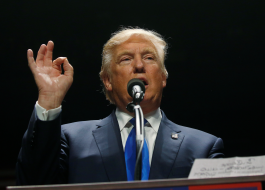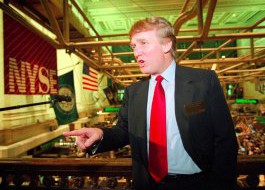 Trump even added a portrait of Jackson to the Oval Office.Pool/Getty Images
Trump even added a portrait of Jackson to the Oval Office.Pool/Getty Images
During his presidency, Andrew Jackson's populist rhetoric and popularity with "the common man" earned him the nickname "King Mob."
Today, he seems to have one new addition to his fan base.
President Donald Trump has placed a portrait of the seventh US president in the Oval Office and criticized the decision to replace the seventh president's portrait on the $20 bill with one of Harriet Tubman. In one interview, Trump even speculated that Jackson might have even been able to stop the Civil War from breaking out, calling him "a very tough person" with a "big heart."
The statement attracted criticism, with critics noting that Jackson was an unrepentant slaveholder himself.
The controversy over "Old Hickory" isn't new. He's been a divisive figure since his presidency, attracting condemnation for his forced and bloody removal of the Cherokee from their homelands, his status as a slave-holder, his penchant for dueling and violent threats, and what some consider a tyrannical bent. However, Jackson usually fares well in presidential rankings, coming in at number 18 in CSPAN's 2017 list. Supporters tend to cite his populism and advocacy for poorer Americans as positive points in his legacy. For more details on Jackson's life and legacy, don't miss Business Insider's previous report on the statesman.
"Jackson is widely respected by many Americans," says Columbia University history professor and "The Fiery Trial" author Eric Foner. "On the other hand, there are those who criticize him strongly because of his policy vis-a-vis Native Americans and slavery. If Trump knows about American history, that's a good thing. I don't care about who he's talking about — Jackson, Lincoln, the Roosevelts, whoever, Reagan. The problem is, he's resurrecting Jackson without any real knowledge of who Jackson was or what Jackson did. So that's a kind of fake history, to go along with fake news."
With that in mind, here's what Jackson's leadership style looked like during his two terms as president:
Jackson was from a humble background, and got his first taste of leadership during wartime.
Jackson could certainly claim the title of "self-made man," as he was born to a Scotch-Irish immigrant family in 1767 in one of the Carolinas — historians aren't quite sure which. As a child, he was orphaned and slashed in the face by an English officer during the American Revolution.
Foner says that, while Jackson went on to accrue great wealth and power during his lifetime, his egalitarian streak probably came from a sincere place, due to his obscure background.
He went on to study law, moved to Tennessee, and entered the political realm as the territory achieved statehood. Jackson ended up building a large plantation known as the Hermitage, where he came to enslave 150 men, women, and children by the end of his life.
Jackson's rise in society accelerated when he led an army to successfully defend New Orleans against the British during the War of 1812. Although the war was technically over by that point, Meacham compares this victory to the triumph of Henry V at Agincourt, serving to inspire Americans and bolster Jackson's popularity.
Jackson went on to fight against the Seminole tribe in Florida, in order to seize native lands, oust the Spanish from the territory, and prevent the region from being a haven for escaped slaves.
Jackson's victories against the British and Native Americans ended up cementing his status as a war hero, along with his leadership style — his soldiers referred to him as "Old Hickory" in reference to his toughness.
As a leader, Jackson often took things personally and surrounded himself with friends.
After losing his first presidential race to John Quincy Adams — thanks to a deal in Congress that Jackson supporters called the "Corrupt Bargain" — Jackson ran again and won in 1828.
However, the success came at a cost. Politics had become personal during the race. Jackson's wife Rachel was accused of bigamy during the campaign — due to the fact that she hadn't realized her first marriage was not technically dissolved when she married Jackson. The accusations took their toll on Rachel, and Jackson blamed the stress for her death that year. He vowed to never forgive his political rival Adams.
His personal approach to politics continued during his term. Author Jon Meacham writes in his Pulitzer-winning book "American Lion" that Jackson once described America as "one great family" during the nullification crisis. At the same time, he flew into such a rage that he threatened to hang South Carolina's leaders and personally lead an army down south to deal with the rebels.
Unlike predecessors like George Washington, Jackson did not necessarily appoint individuals to positions based on their talents. After his first administration became bitterly divided when the wives of his Cabinet members shunned Peggy Eaton, the wife of his Secretary of War, due to rumors about her loose morals, he fired everyone and became alienated from Vice President John Calhoun.
After that, he preferred to stock a so-called, unofficial "Kitchen Cabinet" with friends and allies, to whom he often turned for advice.
Jackson was a divisive leader who inspired devotion... as well as the first recorded assassination attempt on an American president.
When the seventh president was first elected, he hosted a wild party in the White House, opening the building up to the public.
"I think the thing is that Jackson used his presidency to criticize and in some ways combat the 1% of that era," Foner said. "He destroyed the Bank of the United States, the most powerful economic institution in the country. He spoke about the need for government to side with the common man, not the business interests."
"I was born for a storm and a calm does not suit me," Jackson once said, according to Meacham. As an intensely partisan, often hot-headed leader, Jackson was never one to try to appeal to both sides of the aisle on many issues.
Then again, many people loathed the man, viewing him as an "American Caesar." In 1835, an unemployed house painter from England attempted to shoot Jackson with a pistol at the US State Capitol. It misfired, and, according to legend, Jackson beat the man senseless with his cane.
Regardless of the would-be assassin's motives, many contemporaries of Jackson saw him as abusing the power of the presidency. In his personal life, he could be quite violent, killing one man long before his political career in 1806, over a fight about a horse race.
The most famous case of Jackson's divisiveness came about when he usurped the Supreme Court's resolution of Cherokee sovereignty on their tribal lands in Georgia. The subsequent Trail of Tears, which saw Jackson forcibly drive the tribe away from their land, ended up claiming thousands of lives.
Jackson had a domineering leadership style — but that doesn't mean he would have stopped the Civil War.
When South Carolina refuse to accept a federal tariff, Jackson became infuriated and quickly dealt with the issue.
"Jackson, although a believer in state's rights, was a strong nationalist and said that no state can decide which laws it will abide by and not abide by," Foner says. "He got Congress to authorize him to use military force if necessary to have the law operative in South Carolina, and South Carolina backed down."
This reaction highlights the decisive penchant for action that he demonstrated during his tenure as president. However, Foner says that there was one important difference between the Nullification Crisis and the Civil War.
"South Carolina was alone at that time," he says. "The other southern states did not support it, so it was pretty easy for Jackson to exert national pressure on them. Fast forward 30 years and you have the secession crisis, with seven states, and later 11. That's a far greater crisis, and it's hard to see what Jackson could have done. Send force? Well, that would have been a civil war. Just by force of personality, telling them to stop? Things were too far gone for that. I think the notion that anyone could have averted the war at that point is really wrong, whether it was Lincoln, Jackson, or anybody else."
 Trump even added a portrait of Jackson to the Oval Office.Pool/Getty Images
Trump even added a portrait of Jackson to the Oval Office.Pool/Getty Images







